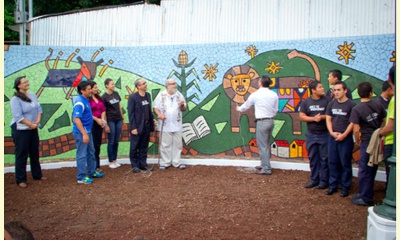|
|
UNICEF launches new spots against violence in El Salvador
un articulo por Voces, El Salvador
Video: UNICEF lanza campaña contra la violencia en la niñez
Calle 13, Shaka and Dres, Maria Isabel Rodriguez, Agustin "Tin"
Ruiz, and Fermando Llort support the campaign "Aren't you
outraged?" with image and voice. 
The mural "The Joy of Hope and Peace" by the Salvadoran artist Fernando Llort
click on photo to enlarge
The United Nations Fund for Children (UNICEF) has launched new
radio spots and campaign messages "Aren't you outraged" that aims
to change the way people think and act against the violence that is
affecting children and adolescents in El Salvador.
The Puerto Rican group Calle 13 provides part of the image
campaign, with two spots in which its members, Eduardo Cabra
Martínez (visitor) and René Pérez Joglar (resident) call for action
against violence in the country . "Aren't you outraged by the
violence that affects children and adolescents in El Salvador," asks
the visitor at the beginning of the spot, and then he encourages the
resident to participate, get involved and come up with ideas to deal
with the problem.
In the same campaign, other spots were launched today that will
feature the likeness and voice of former minister and promoter of
human rights, Dr. Maria Isabel Rodriguez; the beach soccer player,
Agustin "Tin" Ruiz; the renowned artist Fernando Llort and the
Salvadoran duo of Shaka and Dres (who denounce school violence in
their video). The spots will air on a special TV show in channels
allied with the strategy, and they will kick off a viral campaign
supported by celebrities and adolescents participating in the project
with support by virtual activists.
El Salvador is, according to a recent report by UNICEF, the country
with the highest murder rate of children and adolescents.
Furthermore, in the country 7 out of 10 children suffer abuse in
their homes and violence is a major cause of school dropouts. In
this context, the communication strategy "Aren't you outraged?" is
part of the global campaign ENDViolence of UNICEF. Its
spokesman is Liam Neeson. It aims to generate awareness of the
issue and promote social mobilization to end violence in the home,
school and community; supported by media and national celebrities
from different fields (music, sports, television, art, etc.), as well as
private sector and civil society leaders.
In addition to the component of public mobilization, the strategy
also includes local development of training activities and
participation of adolescents in favor of their rights and coexistence.
Thus, more than 400 adolescent leaders from 26 schools in three
municipalities with high rates of violence are receiving workshops in
communication, leadership, gender sensitivity and art for the
prevention of the violence that affects them. The development of
workshops and school awareness and mobilization campaigns have
involved more than 10,000 students in schools and more than
3,000 families.
The campaign also calls upon people to become virtual activists on
the issue, through the Internet and social networks: Facebook,
Twitter, Instagram, YouTube, Flickr, email marketing, etc., in a
multichannel activity throughout the country and Latin America.
(Click here for a Spanish version of this article)
|








|
DISCUSSION
Pregunta(s) relacionada(s) al artículo :
How to stop violence against children,
* * * * *
Comentario más reciente:
Molly,
Hi! I agree with most of what you say below. By am confused by what you say here :
"The value of the ritual must be honored but it's expresstion must be changed to one which is symbolical the same without any harm to the initates. The group must be allowed to develop this change to the ritual and the members must feel positive about themselves as a result of this change."
IMO, if the reason for the ritual is to control and hurt others, which most rituals are for in these situations, it might be better to not perform the ritual at all. But please feel free to post and clarify what you said if I misunderstood it. Thanks.
Neil
--------
Ritual abuse as part of cultural practice is very difficult to dimish without tampering with the culture as a whole. I know from working in social work with abused children in the US that all ritual abuse is culturally related. The adult prepentrator is encouraged by his ties to the group to met their expectations and feels justified by that group's consenus.
Not only the individuals but the group need to see themselves and the role of parenting/ caring of the young differently. . ... continuación.

|
|









